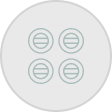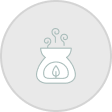A central role in Traditional Chinese Medicine (TCM) is played by the vital energy "Qi," which is kept in flow by the two life forces of Yin and Yang. According to TCM, when Yin and Yang are in balance, we feel healthy. If the energy flow is disrupted, for example by environmental factors such as cold, heat, drafts, poor diet, emotional stress, or overexertion, health problems can arise, according to TCM. Among medicinal plants (according to TCM), medicinal mushrooms hold particular significance, having been used in TCM for thousands of years. The oldest official list of medicinal substances, dating from the 29th century BC, includes several mushroom species that were already used for therapeutic purposes at that time.
Here, too, there is a strong parallel to Ayurveda – both systems understand food as medicine. However, differences become apparent in the details: while in Ayurveda, a diet tailored to one's constitution is crucial for balancing the doshas, in Traditional Chinese Medicine (TCM) everything revolves around energy flows. TCM assumes that food can have an energetic effect: some foods have a cooling effect (yogurt, for example), some a heating effect (chili, for example); some foods reduce, some increase Qi.
 based on
Reviews
based on
Reviews









